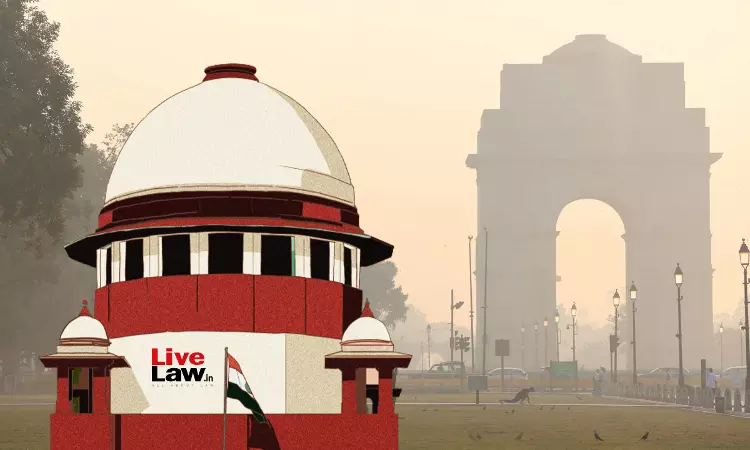- Home
- /
- Top Stories
- /
- Supreme Court Expresses Concern...
Supreme Court Expresses Concern Over Deadline Extension Given To NCR Power Plants For Compliance With Statutory Emission Norms
Amisha Shrivastava
28 Jan 2025 10:28 AM IST
The Supreme Court on Monday expressed concern over extension of three years granted by the government to power plants to comply with statutory emission norms for Sulphur Dioxide (SO2) and non-SO2 pollutants. “If these timelines are extended, there will be a problem for Delhi. So CAQM should suggest some interim guidelines and based on those suggestions we can pass an...
The Supreme Court on Monday expressed concern over extension of three years granted by the government to power plants to comply with statutory emission norms for Sulphur Dioxide (SO2) and non-SO2 pollutants.
“If these timelines are extended, there will be a problem for Delhi. So CAQM should suggest some interim guidelines and based on those suggestions we can pass an order under Article 142. The compliance deadlines keep getting extended”, Justice Abhay Oka remarked.
A bench of Justice Abhay Oka and Justice Ujjal Bhuyan directed the Commission for Air Quality Management in NCR (CAQM) to recommend interim environmental norms for 11 power plants and their units in NCR till the compliance deadlines for statutory emission norms reach.
“We direct CAQM to consider and recommend the norms which must be followed by these 11 plants and units of the plants till the deadlines provided in Table 1 of Item 25 reach, so that pollution can be curbed. CAQM may consult the Ministry of Power and Ministry of Environment and Forest. We grant time of 1 month to CAQM to submit its recommendations. Even the response of the Union of India shall be also filed within one month”, the Court directed.
The Court was hearing the MC Mehta case on issues surrounding air pollution in Delhi caused by power plants, vehicle fuel identification through color-coded stickers, and the implementation of the Solid Waste Management Rules.
Amicus Curiae Aparajita Singh informed the Court that there are 11 power plants in NCR, some owned by the state and others privately held. In Delhi, the power plants operate on gas, and the Amicus noted that power plants contribute approximately 8 percent of the overall pollution in the region.
Justice Oka sought clarification on the statutory provisions and norms applicable to power plants. The Amicus stated that deadlines for compliance with the Ministry of Environment, Forest, and Climate Change (MoEF&CC) emission norms have been extended.
She provided details on the extension of deadlines for implementing emission standards:
Category A: Power plants within 10 km of the NCR—compliance extended from 2024 to 2027.
Category B: Thermal power plants within 10 Kms of critically polluted areas—compliance extended from 2025 to 2028.
Category C: Other thermal power plants—compliance extended from 2026 to 2029.
The Amicus explained that some units are set to close (retire) as they are old.
As per MoEF notification, units retiring by 2030 and are exempt from compliance. Initially, the deadline for retirement was 2027. However, Additional Solicitor General (ASG) Aishwarya Bhati stated that an embargo exists on retiring plants due to the country's energy requirements.
Justice Oka raised concerns that extending timelines for compliance might provide leeway for pollution in the interim. “Where do we get the definition of non-retiring units and retiring units? Because the deadline extension gives them a license to create pollution in the meanwhile”. He inquired.
The Court suggested that the CAQM propose interim guidelines, which could be formalized through an order under Article 142 of the Constitution.
The Amicus pointed out that many plants do not meet the Sulphur Dioxide (SO₂) emission norms by installing Flue Gas Desulphurisation (FGD) equipment. Thermal Power Plants are required to comply with emission norms prescribed by the MoEF&CC.
Rule 3(1) of the Environment Protection Rules, 1986 provides that emission standards for industries will be as prescribed in Schedules I to IV. In its order, the Court directed the Union of India to submit further modifications made to Table 1 under Schedule I, Item 25 of the Rules. This table divides thermal power plants into three categories: those installed before December 31, 2003, those installed between January 1, 2003, and December 31, 2016, and those installed on or after January 1, 2017.
The Court noted that different timelines have been prescribed in the table for compliance with parameters, including SO₂ emissions, based on whether the units are retiring or non-retiring.
The Court also directed the Union of India to clarify the definitions of retiring and non-retiring units and to confirm whether any of the 11 plants, comprising 35 units, include retiring units. The bench emphasized that if power plants in Category A fail to comply, it could severely affect Delhi's pollution levels.
Case no. – WP (C) 13029/1985
Case Title – MC Mehta v. Union of India



